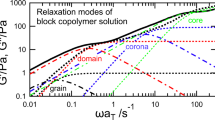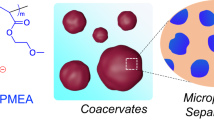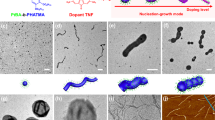Abstract
DIBLOCK copolymers, comprised of two distinct homopolymers covalently bonded together at one end, undergo a transition on cooling from a state in which the segments of the blocks are homogeneously mixed to one in which they are segregated locally1,2. This microphase separation is driven by the enthalpy of unfavourable interactions between segments. Here we report the microphase separation of a diblock copolymer melt on heating. Similar in nature to the lower critical solution temperature seen in polymer mixtures, this lower critical ordering transition is driven by entropic factors—specifically, by a negative volume change on mixing of the blocks. The transition to the microphase-separated state alters the rheological and mechanical properties of the copolymer markedly, the material gaining a non-zero equilibrium modulus above the ordering transition. This suggests potential technological applications of these copolymer systems as 'smart' materials.
This is a preview of subscription content, access via your institution
Access options
Subscribe to this journal
Receive 51 print issues and online access
$199.00 per year
only $3.90 per issue
Buy this article
- Purchase on Springer Link
- Instant access to full article PDF
Prices may be subject to local taxes which are calculated during checkout
Similar content being viewed by others
References
Goodman, I. (ed.) Developments in Block Copolymers (Applied Science, New York, 1982).
Meier, D. J. (ed.) Block Copolymers: Science and Technology (MMI Hardwood Academic, Midland, 1983).
Meier, D. J. J. Polym. Sci. C26, 81–98 (1969).
Leary, D.F. & Williams, M. C. J. Polym. Sci. B8, 335–340 (1970).
Helfand, E. & Wasserman, Z. R. Macromolecules 9, 879–887 (1976).
Semenov, A. N. Soviet Phys. JETP 61, 733–742 (1985).
Ohta, T. & Kawasaki, K. Macromolecules 19, 2621–2632 (1986).
Olvera de la Cruz, M., Mayes, A. M. & Swift, B. W. Macromolecules 25, 944–948 (1992).
Hashimoto, T., Nagatoshi, K., Todo, A., Hasegawa, H. & Kawai, H. Macromolecules 7, 364–373 (1974).
Hashimoto, T., Todo, A., Itoi, H. & Kawai, H. Macromolecules 10, 377–384 (1977).
Hashimoto, T., Shibayama, M. & Kawai, H. Macromolecules 13, 1237–1247 (1980).
Thomas, E. L., Alward, D. B., Kinning, D. J., Handlin, D. L. & Fetters, L. J. Macromolecules 19, 2197–2202 (1986).
Hasegawa, H., Tanaka, H., Yamasaki, K. & Hashimoto, T. Macromolecules 20, 1651–1662 (1987).
Thomas, E.L., Anderson, D.M., Henkee, C. S. & Hoffman, D. Nature 334, 598–601 (1992).
Almdahl, K., Koppi, K. A., Bates, F. S. & Mortensen, K. Macromolecules 25, 1743–1751 (1992).
Leibler, L. Macromolecules 13, 1602–1617 (1980).
Ramos, A. R. & Cohen, R. E. Polym. Engng Sci. 17, 639–646 (1977).
Fischer, E. W. & Jung, W. G. Makromol. Chem., Makromol. Symp. 26, 179–189 (1989).
Bates, F. S., Rosedale, J. H., Bair, H. E. & Russell, T. P. Macromolecules 22, 2557–2564 (1989).
Bates, F. S., Rosedale, J. H. & Fredrickson, G. H. J. chem. Phys. 92, 6255–6270 (1990).
Rosedale, J. H. & Bates, F. S. Macromolecules 23, 2329–2338 (1990).
Fredrickson, G. H. & Helfand J. chem. Phys. 87, 697–705 (1987).
Yang, H., Hadziioannou, G. & Stein, R. S. J. Polym. Sci., Polym. Phys. edn 21, 1591–1595 (1983).
Russell, T. P. in Handbook of Synchrotron Radiation vol. 3 (eds Brown, G. S. & Moncton, D. E.) 379–469 (North-Holland, Amsterdam, 1991).
Bank, M., Leffingwell, J. & Thies, C. J. Polym. Sci. Part A-2 10, 1097–1109 (1972).
McMaster, L. P. Macromolecules 6, 760–773 (1973).
Nishi, T., Wang, T. T. & Kwei, T. K. Macromolecules 8, 227–234 (1975).
Lacombe, R. H. & Sanchez, I. C. J. phys. Chem. 80, 2568–2580 (1976).
Paul, D. R. & Newman, S. Polymer Blends (Academic, New York, 1978).
Mortensen, K., Brown, W. & Norden, B. Phys. Rev. Lett. 68, 2340–2343 (1992).
Mortensen, K. Europhys. Lett. 19, 599–604 (1992).
Yeung, M., Desai, R. C., Shi, A.-C. & Noolandi, J. Phys. Rev. Lett. (in the press).
Mam, S., Malone, M. F. & Winter, H. H. J. Rheol. 36, 1625–1649 (1992).
Bauer, B., Hammouda, B. & Russell, T. P. Macromolecules (in the press).
Author information
Authors and Affiliations
Rights and permissions
About this article
Cite this article
Russell, T., Karis, T., Gallot, Y. et al. A lower critical ordering transition in a diblock copolymer melt. Nature 368, 729–731 (1994). https://doi.org/10.1038/368729a0
Received:
Accepted:
Issue Date:
DOI: https://doi.org/10.1038/368729a0
This article is cited by
-
Synthesis and characterization of MDI and functionalized polystyrene based poly(urethane-urea-amide)
International Journal of Plastics Technology (2016)
-
Hartree analysis of χ for a pressure-responsive diblock copolymer: Temperature-pressure superposition
Macromolecular Research (2012)
-
Driving force for phase segregation in polymer mixtures
Macromolecular Research (2011)
-
Performing under pressure
Nature Nanotechnology (2009)
-
Self-assembled block copolymers: Bulk to thin film
Macromolecular Research (2008)
Comments
By submitting a comment you agree to abide by our Terms and Community Guidelines. If you find something abusive or that does not comply with our terms or guidelines please flag it as inappropriate.



